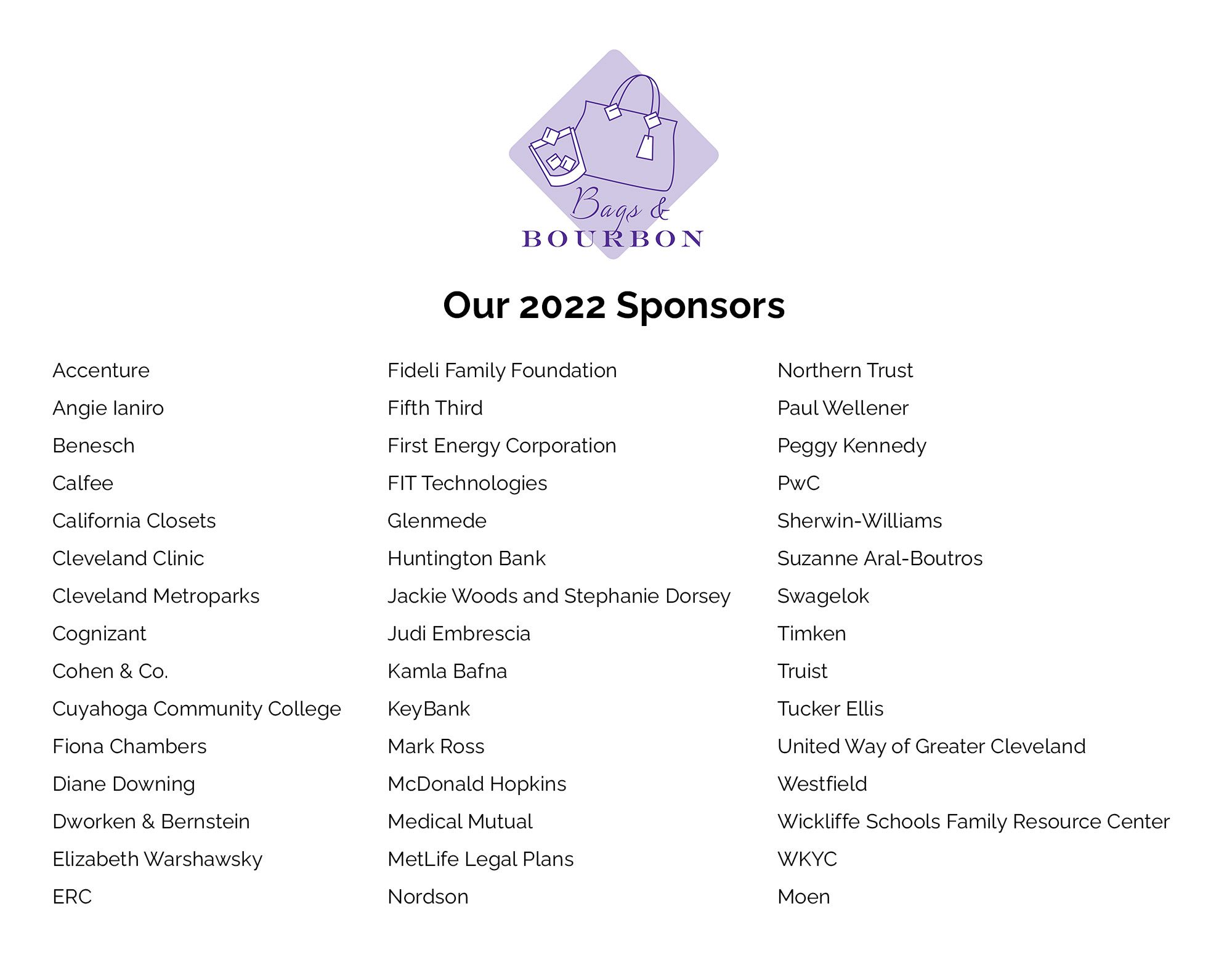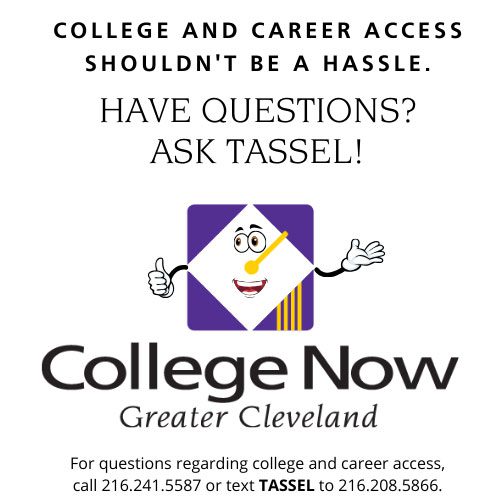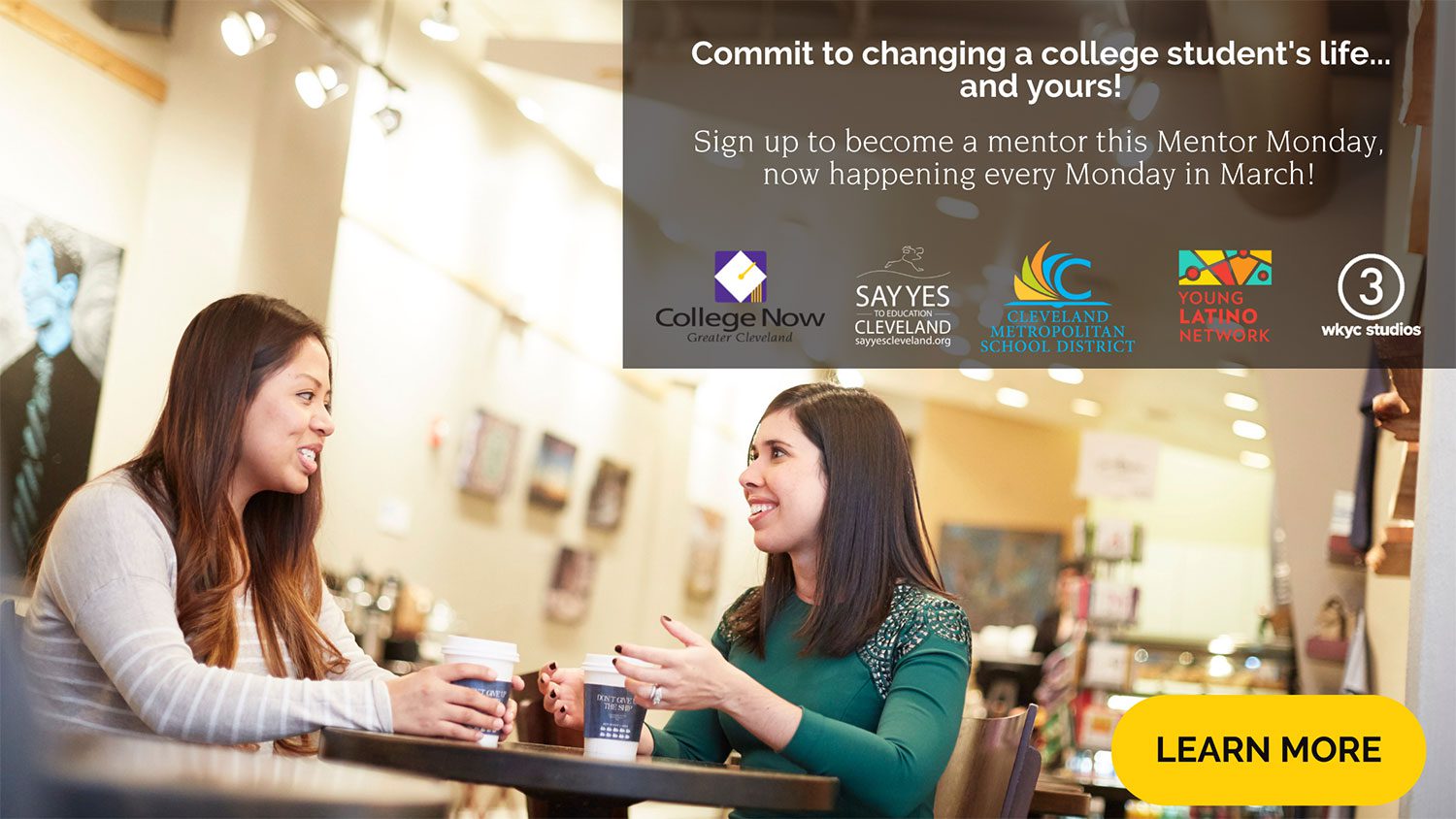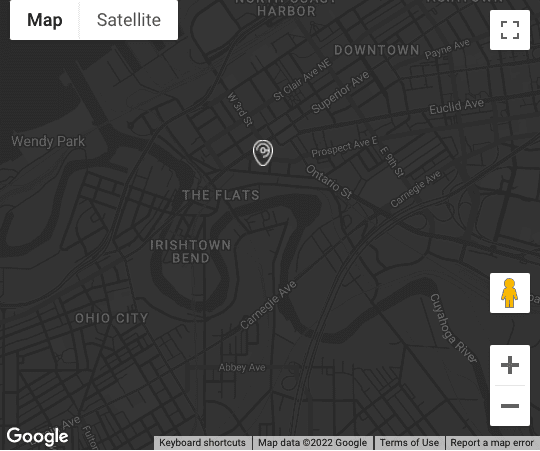Black Lives Matter: We Stand with Our Community in Declaring Racism a Public Health Crisis
The statement below was shared with the College Now community on June 9, 2020. For a list of anti-racist resources and supports organized by College Now staff, please continue scrolling to the bottom of this message.
College Now Greater Cleveland joins the voices of the community in Cleveland and in cities around the world expressing anger and indignation over the murder of George Floyd and the numerous other Black and brown people killed at the hands of police. We condemn all forms of institutional racism in the strongest possible terms. We are proud to join the Greater Cleveland Partnership and over 20 local organizations in declaring racism a public health crisis in Cleveland and committing to take action to undo the structural racism present in our community. You can read the full statement of community commitment on the Greater Cleveland Partnership’s website. College Now was founded in 1967, the same year that Cleveland elected Carl Stokes, the first Black mayor of a major U.S. city, and the year that Martin Luther King, Jr. announced the Poor People’s Campaign, a movement to bring economic justice to the poor and disenfranchised of America, regardless of race, ethnicity, or religion. It is with heavy hearts that we reflect on the last 53 years of our existence and recognize that so many societal problems continue to plague our community since we first opened our doors to help Cleveland public school students go to college. College Now works to overcome racial inequalities by ensuring equal access in education, which is a key factor in creating an equitable society. To America’s first Hispanic and Latina Supreme Court Justice, Sonia Sotomayor, education means equality. She said, “Until we get equality in education, we won’t have an equal society.” To American hero, former slave, and famed abolitionist Frederick Douglass, education meant opportunity. He said, “Some know the value of education by having it. I know its value by not having it.” We must acknowledge that, due to our country’s 400-year history of marginalizing Black people, racial disparities exist at every point along the higher education pipeline, from the application process to degree completion. Research has shown that segregation is a contributing factor to disparities in college completion rates. Furthermore, financial and social resources, which are impacted by racial and social inequalities, also have a major impact on enrollment and completion. College Now recognizes that it is not enough to simply be “not racist.” We must be anti-racist. We must call out racism when we see it, even when it is implicit, and we must recognize that racism is not a problem to which Black people must figure out solutions. It is a problem that must be addressed individually and systemically by all of us. Here at College Now, we have been talking and learning about issues related to diversity, equity, and inclusion more intensively over the past few years. We recognize, while we may not always have lived up to it, we have an important role to play, as access to education is one of the keys to social and economic mobility in the U.S., and because the communities we serve and work with are directly affected by systemic racism every day. College Now will continue to listen to and to support Black people, and we will use our platform to bring systemic change so our society can fully realize equality and justice for all. Black lives matter. In love, anger, justice, and hope,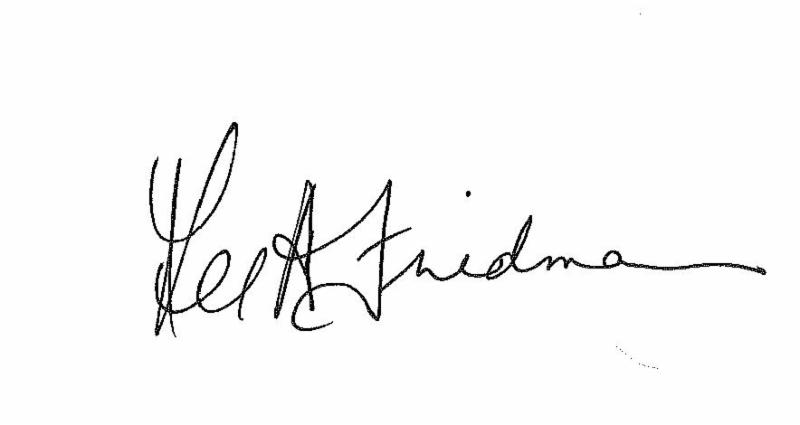 Lee Friedman
CEO, College Now Greater Cleveland
—
Anti-Racist Resources and Support Links
Updated: May 4, 2021
The following list has been compiled and continues to be updated by College Now staff. We encourage you to take some time to explore the below resources and to share widely. This is work we all need to do and to truly commit to doing. It is a lifelong process and one that we all must take personal responsibility for. Thank you for joining us in this work – you are helping to make our organization and our community a more just and equitable place.
Lee Friedman
CEO, College Now Greater Cleveland
—
Anti-Racist Resources and Support Links
Updated: May 4, 2021
The following list has been compiled and continues to be updated by College Now staff. We encourage you to take some time to explore the below resources and to share widely. This is work we all need to do and to truly commit to doing. It is a lifelong process and one that we all must take personal responsibility for. Thank you for joining us in this work – you are helping to make our organization and our community a more just and equitable place.
Resources for Allies
Discover your Baseline- Harvard Implicit Association test
- Antiracist Checklist for White Allies
- The Way We Talk about Racial Disparities in Education Matters,
- Source: Lumina Foundation. A short quiz to identify how you talk about race, systems, and outcomes. While specific to education, could also be illuminating for others as
-
- Scaffolded Anti-racism resources for white allies. Find the appropriate stage on the chart, and use the resources recommended.
- “Anti-Racism Daily” listserv. Subscribe, or visit their list of topics.
- “Tips on Taking Action and Educating Yourself on Racial Injustice,” MENTOR New York
- “Institutionalized Racism: A Syllabus,” Catherine Halley, JSTOR
- “Anti-Racism Resources,” list compiled by activist and filmmaker Sarah Sophie Flicker and social media strategist Alyssa Klein
- “103 Things White People Can Do for Racial Justice,” by Corinne Shutack, Medium.
- “Here’s How White People can Support the Fight Against Police Brutality,” by Jessica Probus, BuzzFeed
- “The 1619 Project” New York [See especially the essay by Nikole Hannah-Jones.]
- Racial Justice and Racial Equity in the College of Education and Human Ecology at The Ohio State University
- “How We Rise” blog by the Brookings Institution
- “Racial Justice Resources,” categorized list compiled by activist and writer Rachel Ricketts
- “First, Then, Learn. Anti-Racism Resources for White People,” by Julie Wuench, Forbes
- “Journalists of Color Racial Equity-Focused Articles,” compiled by Heidi Schillinger
- “Resources for Helping and Healing,” Chronicle of Evidence-Based Mentoring
- Race & COVID, The COVID Tracking Project at The Atlantic
- “COVID-19 Made It Impossible to Ignore Racial Disparities in Health Care. Here’s What’s Needed for Equity” by Ayana Byrd, Health
- “The Impact of Policing on Black Mental Health,” by Taneisha Fair, Center for Community Solutions
- “Experts Explain How to Shut Down Common ‘All Lives Matter’ Arguments,” by Chris Tognotti and JR Thorpe, Bustle
- “For Our White Friends Desiring to be Allies,” by Courtney Ariel, Sojourners
- “White Anti-Racism: Living the Legacy,” Teaching Tolerance
- “Why Every American Should Celebrate Juneteenth,” by Liz Schletens
- “The Death of George Floyd, In Context,” by Jelani Cobb, The New Yorker
- “This is How Loved Ones Want Us to Remember George Floyd,” by Alisha Ebrahimji, CNN
- “Of Course There Are The State is Failing Black People,” by Keeanga-Yamahtta Taylor, New York Times
- “George Floyd Could Have Been My Brother,” by Rita Omokha, Elle
- “How to Make This Moment the Turning Point for Real Change,” by Barack Obama, Medium
- “I am So Tired,” by Robert Sellers, Vice Provost for Equity and Inclusion & Chief Diversity Officer at the University of Michigan
- “You shouldn’t need a Harvard degree to survive birdwatching while black,” by Samuel Getachew, Washington Post
- “Cleveland Race Relations: From the Civil Rights Movement to Black Lives Matter,” The City Club of Cleveland, September 30, 2020
- Just Mercy (film)
- When They See Us (series, Netflix)
- 13th (documentary film, Netflix)
- Let It Fall (documentary film, Netflix)
- Khadija Mbowe YouTube series
- 10 Documentaries to Watch about Race DOCPlay
- 29 Movies, Shows and Documentaries to Educate Yourself on Racial Justice, The Every Girl
- “What Matters,” series of interviews and short documentaries on timely issues produced by Black Lives Matter
- Still Processing podcast
- Code Switch podcast
- For suggestions, see “15 Informative Podcasts to Learn about Race Relations in America,” by Karla Pope, Good Housekeeping
- For more suggestions, see “The Anti-Racist Podcast List,” by Brea Baker, Elle
- KidLit: Anti-Racist Resources for Children, Families, and Educators,” by Olugbemisola Rhuday- Perkovich, The Brown Bookshelf
- “KidLit4BlackLives Rally,” The Brown Bookshelf via YouTube
- “How to Talk to Kids about Racism, Explained by a Psychologist,” by Anna North, Vox
- “Inclusive Event Planning,” The NCCSD Clearinghouse and Resource Library
- “If You Want a Truly Equitable Workplace, You Must Get Over the Fear of Conflict” Mimi Fox Melton and Karla Monterroso, Fast Company
- “How to Elevate Diversity, Equity, and Inclusion Work in your Organization,” Wharton School, University of Pennsylvania
- “Nine (Free!) Online Classes for Managers Who Care About Diversity and Inclusion,” by Alyse Kalish, The Muse
- Any winner of the Anisfield-Wolf Book Awards, presented by the Cleveland Foundation
- Khan Academy Resources on Black History, Politics, and Culture
- See “Your Antiracism Reading List isn’t Complete without Fiction About Black People,” by Brittany Wong, Huffington Post
- America’s Original Sin, Jim Wallis (2015)
- An African American and Latinx History of the United States, Paul Ortiz (2018)
- An Indigenous Peoples’ History of the United States, Roxanne Dunbar-Ortiz (2014)
- Between the World and Me, Ta-Nehisi Coates (2015)
- Biased, Jennifer Eberhardt (2019)
- Blindspot: Hidden Biases of Good People, Mahzarin Banaji and Anthony Greenwald (2013)
- Chokehold: Policing Black Men, Paul Butler (2017)
- Citizen: An American Lyric, Claudia Rankine (2014)
- Conversations in Black: On Politics, Power and Leadership, Ed Gordon (2020)
- Good Talk: A Memoir in Conversations, Mira Jacobs (2019)
- Have Black Lives Ever Mattered?, Mumia Abu-Jamal (2017)
- How to be an Antiracist, Ibram X. Kendi (2019)
- I’m Still Here: Black Dignity in a World Made for Whiteness, Austin Channing Brown (2018)
- Just Mercy: A Story of Justice and Redemption, Bryan Stevenson (2014)
- Me and White Supremacy: Combat Racism, Change the World, and Become a Good Ancestor, Layla F Saad (2020)
- Mindful of Race: Transforming Racism from the Inside Out, Ruth King (2018)
- So You Want to Talk About Race, Ijeoma Oluo (2018)
- Stamped from the Beginning: The Definitive History of Racist Ideas, Ibram X. Kendi (2016)
- Tears We Cannot Stop: A Sermon to White America, Michael Eric Dyson (2017)
- The Color of Law: A Forgotten History of How Our Government Segregated America, Richard Rothstein (2017)
- The Fire Next Time, James Baldwin (1963)
- The Fire This Time: A New Generation Speaks About Race, edited by Jesmyn Ward (2016)
- The New Jim Crow, Michelle Alexander (2010)
- The Racial Healing Handbook, Anneliese A. Singh (2019)
- The Warmth of Other Suns: The Epic Story of America’s Great Migration, Isabel Wilkerson (2010)
- What Doesn’t Kill You Makes You Blacker: A Memoir in Essays, Damon Young (2019)
- When They Call You a Terrorist: A Black Lives Matter Memoir, Asha Bandele and Patrisse Cullors (2018)
- White Fragility, Robin DiAngelo (2018)
- Why Are All the Black Kids Sitting Together in the Cafeteria?, Beverly Tatum (2017)
- Why I’m No Longer Talking to White People About Race, Reni Eddo-Lodge (2017)
- Women, Race and Class, Angela Davis (1981)
- Americanah, Chimamanda Ngozi Adichie (2013)
- Beloved, Toni Morrison (1987)
- Go Tell It on the Mountain, James Baldwin (1953)
- Homegoing, Yaa Gyasi (2016)
- Invisible Man, Ralph Ellison (1952)
- The Nickel Boys, Colson Whitehead (2019)
- Rainbow Milk, Paul Mendez (2020)
- The Water Dancer, Ta-Nehisi Coates (2019)
- A is for Activist, Innosanto Nagara (2013), non-fiction
- Anti-Racist Baby, Ibram X. Kendi (forthcoming), non-fiction
- Brown Girl Dreaming, Jacqueline Woodson (2014), fiction
- The Hate U Give, Angie Thomas (2017), fiction
- This Book is Anti-Racist: 20 Lessons on How to Wake Up, Take Action, and Do the Work by Tiffany Jewell (2020), non-fiction
- Stamped: Racism, Antiracism, and You by Jason Reynolds and Ibram X. Kendi (2020), non-fiction
- Follow these organizations and amplify their content:
- @blklivesmatter
- @colorofchange
- @naacp
- @showingupforracialjustice
- @civilrightsorg
- @reclaimtheblock
- @ethelsclub
- @unitedwedream
Support Resources for People of Color
Everyone- “4 Self-Care Resources for Days When the World is Terrible,” by Miriam Zoila Perez, ColorLines
- “Coping with Race-Related Stress,” University of Illinois, Urbana-Champaign
- “How to Deal with Racist People,” by Jens Korff, Creative Spirit
- “Mindfulness and Stress Reduction Resources for People of Color,” Perinatal Support Washington (but resources are for all, regardless of gender!)
- “Surviving Oppression; Healing Oppression,” Tarakali Education
- Overview of Racial Trauma, with resources listed at the end, Mental Health America
- Black, Disabled, and Proud: College Students with Disabilities,” The HBCU Disability Consortium
- ”Students’ Coping Strategies Against Racial Microaggressions,” University of Illinois, Urbana-Champaign
- “Surviving Institutions that Weren’t Created for You,” by Yareliz Mendez-Zamora, Huffington Post
- “Black, Disabled, and Proud: College Students with Disabilities,” The HBCU Disability Consortium
- Antiracist Pedagogy Reading List, by Andrea Aebersold, University of California, Irvine
- Becoming an Anti-Racist Educator, Wheaton College
Call to Action
Get Involved- Register to vote
- Sign a petition (or two)! Anti-Racism Daily listserv often includes opportunities like this in their mailings.
- Showing Up for Racial Justice’s list of black-led racial justice organizations
- The Greater Cleveland Community Bail Fund
- National Bail Out
- Black Lives Matter
- National Bail Fund Network
- The Innocence Project
- George Floyd Memorial Fund

